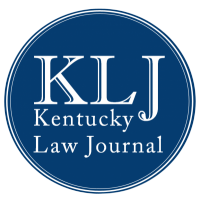Blog Post | 108 KY. L. J. ONLINE | Mar. 26, 2020
Kentucky Business Closures Help “Flatten the Curve,” But Are They Constitutional?
Robert Hudson
Because COVID-19 spreads rapidly through human contact, governments across the world have prohibited most forms of public gatherings to curb infection rates. In Kentucky, Governor Andy Beshear issued executive orders requiring many businesses to close some or all of their operations. For some of these businesses, complying with Beshear’s orders means complete closure until further notice, which could lead to bankruptcy. Over half of U.S. states have issued similar business closure orders.[i]
Despite their effectiveness in slowing the spread of the virus, some government officials and social media personalities have denounced these measures as unconstitutional exercises of government power.[ii]The U.S. Constitution, however, reserves “police powers” to the states.[iii] “Police powers” include a state’s authority to regulate behavior to protect the health, safety, and general welfare of its inhabitants.[iv] According to the Kentucky Supreme Court, a valid exercise of police power must "bear a real and substantial relationship to the public health, safety, morality or some other phase of the general welfare."[v] Valid exercises of state police power do not constitute takings of property without due process of law.[vi]
Both the Kentucky Supreme Court and the U.S. Supreme court have held that, through their police powers, states can enact laws to prevent the spread of disease.[vii] During the early-1900s smallpox outbreak, the Kentucky Supreme Court upheld the constitutionality of state laws that closed stores for sanitization and quarantined individuals suspected to have the disease.[viii] In Jacobson v. Commonwealth of Massachusetts, the U.S. Supreme Court held constitutional a state law that implemented mandatory vaccinations.[ix] The Court opined that a state “has the right to protect itself against an epidemic” and its members “may at times, under the pressure of great dangers, be subjected to … restraint, to be enforced by reasonable regulations, as the safety of the general public may demand.”[x] The U.S. Supreme Court also upheld the constitutionality of state laws that imposed forced quarantines.[xi]
Most developed countries have enacted similar business-closure policies to slow the spread of COVID-19 and protect the health of their citizens. Italy was initially reluctant to implement such policies, but the ensuing health emergency forced it to impose a full lockdown.[xii] Governor Beshear’s orders “bear a real and substantial relationship” to the health of Kentuckians. They are very likely constitutional as a valid exercise of state police powers.
[i] Brakkton Booker, States Are Taking Many Approaches To The Coronavirus. Here's A Look At Each, NPR (Mar. 12, 2020), https://www.npr.org/2020/03/12/815200313/what-governors-are-doing-to-tackle-spreading-coronavirus.
[ii] Elizabeth Joh, Yes, States and Local Governments Can Close Private Businesses and Restrict Your Movement, Politico (Mar. 18, 2020), https://www.politico.com/news/magazine/2020/03/18/states-police-power-coronavirus-135826.
[iii] Joh, supra note 2.
[iv] Joh, supra note 2. See also John Malcolm, In Combating Coronavirus, Trump and Governors Act Constitutionally, The Heritage Foundation (Mar. 20, 2020), https://www.heritage.org/the-constitution/commentary/combating-coronavirus-trump-and-governors-act-constitutionally; John Yoo, Pandemic Federalism, National Review (Mar. 20, 2020), https://www.nationalreview.com/2020/03/pandemic-federalism/; Debra Cassens Weiss, Lawsuits over coronavirus quarantines are unlikely to succeed, experts say, American Bar Association (Mar. 18, 2020), https://www.abajournal.com/news/article/suits-over-coronavirus-quarantines-unlikely-to-succeed-experts-say.
[v] Dep’t For Nat. Res. & Envtl. Protection v. Stearns Coal & Lumber Co., 563 S.W.2d 471, 473 (Ky. 1978).
[vi] Andrew Napolitano, Judge Andrew Napolitano: Coronavirus fear lets government assault our freedom in violation of Constitution, Fox News (Mar. 19, 2020), https://www.foxnews.com/opinion/judge-andrew-napolitano-liberty-coronavirus; New Orleans Pub. Serv. v. City of New Orleans, 281 U.S. 682, 87 (1930) (“ It is elementary that enforcement of uncompensated obedience to a regulation passed in the legitimate exertion of the police power is not a taking of property without due process of law”).
[vii] See, e.g., Allison v. Cash, 137 S.W. 245, 249 (Ky. 1911); Jacobson v. Commonwealth of Massachusetts, 197 U.S. 11, 39 (1905).
[viii] See, e.g., Allison, 137 S.W. at 249; Jacobson, 197 U.S. at 39.
[ix] See, e.g., Allison, 137 S.W. at 249; Hengehold v. City of Covington, 57 S.W. 495, 497 (Ky. 1900).
[x] Jacobson, 197 U.S. at 27-29; David B. Rivkin Jr. &
Charles Stimson, A Constitutional Guide to Emergency Powers, Wall Street Journal (Mar. 19, 2020), https://www.wsj.com/articles/a-constitutional-guide-to-emergency-powers-11584659429.
[xi] Malcolm, supra note 4.
[xii] Dave Lawler, Timeline: How Italy's coronavirus crisis became the world's deadliest, Axios (Mar. 24, 2020), https://www.axios.com/italy-coronavirus-timeline-lockdown-deaths-cases-2adb0fc7-6ab5-4b7c-9a55-bc6897494dc6.html.

